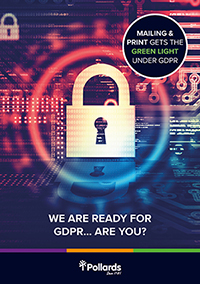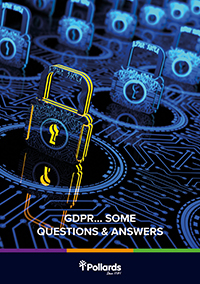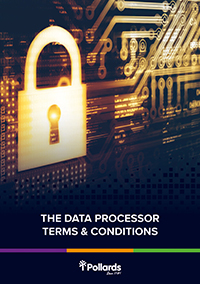GDPR is the biggest change to data protection law for over 20 years.
GDPR stands for General Data Protection Regulation, it is the
EU’s legal framework that sets guidelines for the collection
and processing of personal information of individuals.
To give the public greater control over how their data is used. It
introduces tougher fines for non-compliance and data breaches, and
gives people more say over what companies can do with their data.
The EU’s aim is to give businesses a simpler, clearer legal environment
in which to operate.
GDPR will apply to any organisation irrespective of size which processes and holds the personal data of people residing
in the EU. The new legislation applies to both data “controllers” and “processors”.
CONTROLLERS
…are organisations who collect the data and specify how it is used and processed. Typically, this would be a business or charity with databases of customers and supporters.PROCESSORS
Pollards are a processor as are print and mail on behalf of our customers (controllers). We have put into place strict processes for the control and management of data. In particular, any data that can be used to identify a particular individual, including: name, ID number, location data, or computer IP address.WHAT RIGHTS DOES THIS LEGISLATION GIVE THE INDIVIDUAL?
- THE RIGHT TO BE INFORMED
- THE RIGHT OF ACCESS
- THE RIGHT TO RECTIFICATION
- THE RIGHT TO ERASE
- THE RIGHT TO RESTRICT PROCESSING
- THE RIGHT TO DATA PORTABILITY
- THE RIGHT TO OBJECT
- RIGHTS IN RELATION TO AUTOMATED DECISION MAKING & PROFILING
- CONSENT
- VITAL INTEREST
- PUBLIC TASK
- LEGITIMATE INTEREST
- CONTRACT
- LEGAL OBLIGATION
WHAT HAS POLLARDS DONE?
Pollards has taken its duty as a Data Processor and Data Controller very seriously and has invested a great deal of time and money updating our systems and processes for data management and security. We are able to provide a totally secure data management system:- Secure receipt of data with an exclusive upload portal
- Secure receipt of data with an exclusive upload portal
- Secure encrypted storage, processing and management of data
- Secure encrypted storage, processing and management of data
- Secure proofing via a tailor made online proofing platform
- Secure proofing via a tailor made online proofing platform
- Supply of mailing report once the job has been completed
- Supply of mailing report once the job has been completed
- Secure removal of mailing data once job has been invoiced
- Secure removal of mailing data once job has been invoiced




